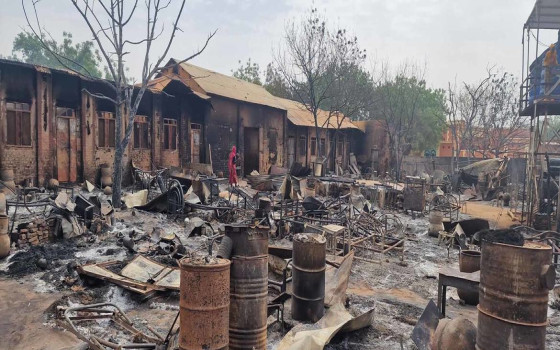
The United Nations warns of the repercussions of contamination with explosive ordnance on the lives of Sudanese.. leading to indiscriminate killing and maiming and impeding the rehabilitation of public infrastructure

- Europe and Arabs
- Tuesday , 9 May 2023 14:14 PM GMT
Khartoum - New York: Europe and the Arabs
The United Nations welcomed the initiative put forward by the Kingdom of Saudi Arabia and the United States of America to hold direct talks between representatives of the two parties to the Sudanese conflict in the Saudi city of Jeddah. At the same time, I warned of the repercussions of contamination with explosive ordnance on the lives of civilians, which leads to indiscriminate killing and maiming and impeding the rehabilitation of public infrastructure, according to what was stated in the daily bulletin issued by the United Nations, and we received a copy of it on Tuesday morning.
UN Deputy Spokesperson Farhan Haq said that the UN - as part of the tripartite mechanism - is working closely with Riyadh and Washington on the situation in Sudan.
The tripartite mechanism includes the United Nations, the African Union and the International Authority on Development (IGAD).
Meanwhile, the United Nations Emergency Relief Coordinator and Under-Secretary-General for Humanitarian Affairs, Martin Griffiths, is holding discussions in Saudi Arabia to ensure that humanitarian aid is transported into Sudan and distributed safely throughout Sudan.
The Special Representative of the Secretary-General, Volker Peretz, remains in Port Sudan - accompanied by a number of UN staff - to carry out many vital tasks, according to Mr. Farhan Haq.
On the humanitarian front, the United Nations and its partners continue to expand humanitarian operations in Sudan as part of efforts to move supplies to respond to rapidly growing needs across the country, according to UN Deputy Spokesperson Farhan Haq at the daily briefing.
In Blue Nile state, the United Nations Children's Fund (UNICEF) and its partners support health and nutrition programmes, including immunization, screening and treatment for malnutrition, as well as pregnancy care and reproductive health services.
In North Darfur, humanitarian partners are supporting health facilities with medicines, water and other items. Twenty health care facilities received water, sanitation and hygiene support, with at least 100,000 liters of water trucked in.
On May 5, the World Health Organization delivered 30 tons of medical supplies to Port Sudan, in partnership with the United Arab Emirates. The shipment contained enough trauma treatments, essential medicines and emergency surgical items to reach 165,000 people through 13 major health facilities.
This is the first air delivery by the World Health Organization to Sudan since the outbreak of the conflict, according to the deputy UN spokesperson.
Meanwhile, the customs clearance of 80 tons of medical supplies unloaded in Port Sudan last week has been completed. This includes intravenous fluids, trauma kits and severe acute malnutrition.
Noting that more humanitarian shipments are expected to reach Sudan in the coming days and weeks, Mr. Farhan Haq called for expedited customs clearance to ensure that life-saving aid reaches those in need as quickly as possible.
The World Food Program resumed operations in Sudan last week, aiming to meet the needs of 384,000 refugees already in Sudan, host communities and internally displaced persons - both formerly and newly displaced - in Gedaref, Gezira, Kassala and White Nile states.
This is the first time that the World Food Program has provided emergency food aid in Gezira State, to which dozens of families have fled from Khartoum, fleeing the conflict in the capital.
The United Nations Mission in Sudan has warned of the dangers posed by explosive ordnance contamination to the lives of civilians, leading to indiscriminate killing and maiming and impeding the rehabilitation of public infrastructure, including schools and roads.
The mission stated that explosive ordnance also constitutes a major obstacle to the safe movement of civilians and the return of the displaced to their homes, undermines the safe distribution of humanitarian aid, restricts access to services and exacerbates food insecurity.
The mission stated that the armed conflicts that have occurred in Sudan since 1955 have left a legacy of explosive hazards, including landmines, cluster munitions and other explosive remnants of war affecting marginalized communities in conflict-affected areas.
The mission said, "The current conflict, which broke out on April 15, exacerbates matters. The massive use of explosive ordnance during the fighting increases the danger to the lives of civilians, especially children, who may misunderstand the danger of these devices and may imagine them as games and play with them."
The United Nations Integrated Transitional Support Mission in Sudan (UNITAMS) and the United Nations Mine Action Service urged citizens to exercise caution and not touch or pick up any of these unexploded ordnances.












No Comments Found